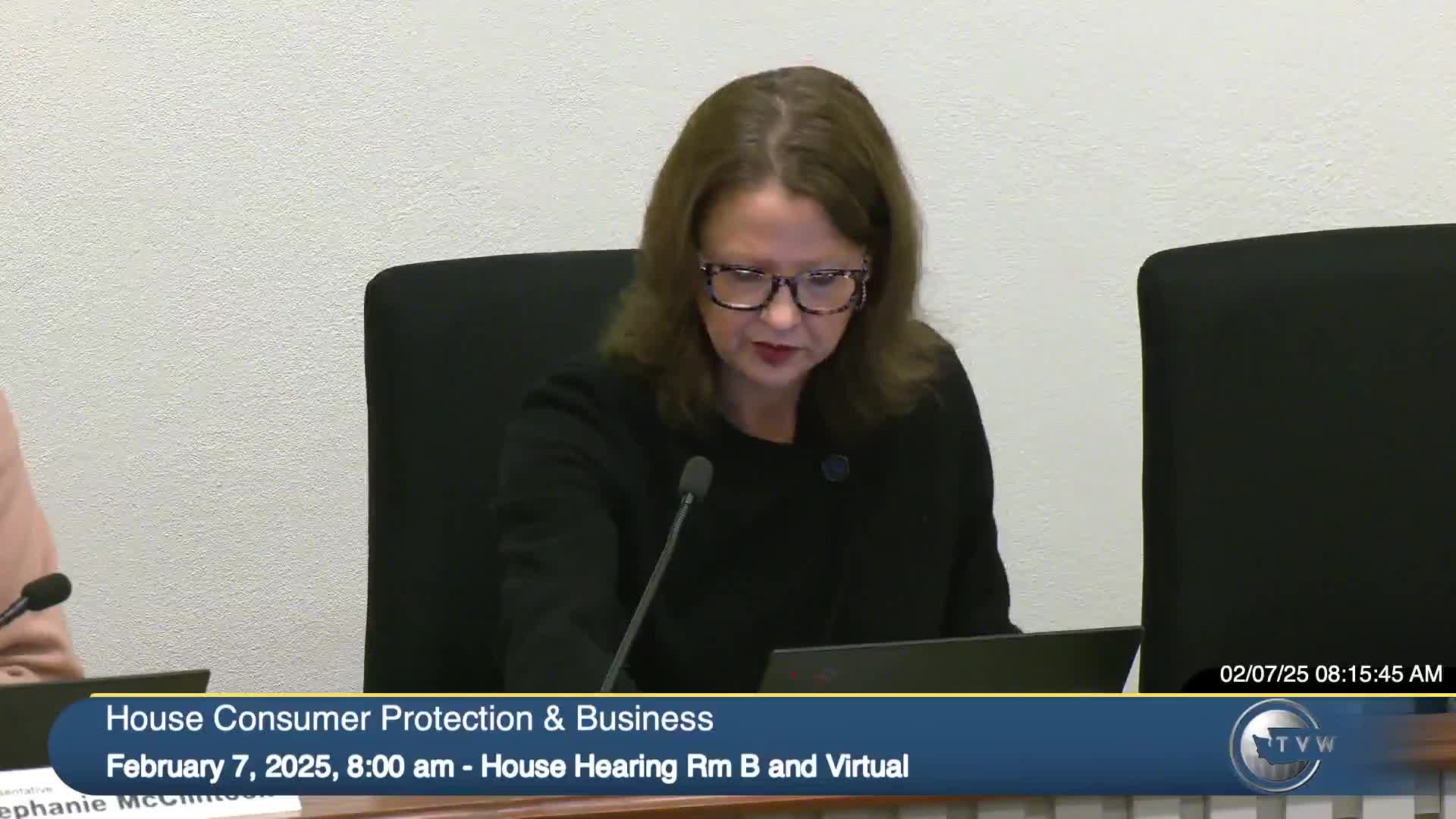Debate in committee over HB 1530: allows regulated businesses such as tow operators to pass credit‑card processing fees with a 3% cap and required no-cost pay
Get AI-powered insights, summaries, and transcripts
Subscribe
Summary
House Bill 1530 would allow statutorily regulated businesses (for example, tow truck operators regulated by the state) to charge a transaction fee up to 3% for credit-card payments if a no-cost payment option is disclosed and available. The bill prompted competing testimony from towing industry representatives and consumer advocates.
House Bill 1530 — described by staff as modernizing payment options for registered tow truck operators and other regulated businesses — prompted extended public testimony from tow‑industry witnesses and consumer‑protection advocates at the Feb. 7 Consumer Protection & Business Committee hearing.
Megan Mulvihill, committee staff, summarized the bill’s core provisions: regulated businesses may charge a transaction fee to cover credit-card processing costs, up to 3% of the payment amount, provided the business offers and discloses a no‑cost payment option. Mulvihill explained interchange fees are typically “around 1 to 3% with a fixed rate of 5 to 25¢ per transaction,” and that the bill defines credit-card payment broadly to include payment cards that incur an interchange fee.
Representative Amy Wallen, prime sponsor, framed the bill as relief for small tow operators who are subject to statutorily set fees but cannot currently pass credit-card processing costs to customers. Wallen described tow operators as small, family-run businesses that operate around the clock and that “to ask that they be able to recover a regular cost of doing business, credit card surcharges like every other Washington business…is completely reasonable.”
Tow‑industry witnesses said the change corrects a statutory-era mismatch. Chester Baldwin of the Towing and Recovery Association of Washington said statutes were drafted before credit cards were common and that the bill would restore fairness and consumer choice, with clear disclosure and a no-cost option. Chris Zachary, owner‑operator and TRAW president, testified that his firm lost $18,000 in 2024 to credit‑card processing costs and said credit cards are now the primary form of payment.
Industry witnesses, including Peter Lukovich, emphasized the bill sets a 3% maximum and requires explicit disclosure and a free payment option; they also cited similar policies adopted in many other states and noted existing government entities (such as the Department of Licensing) already recover processing costs in some contexts.
Consumer advocates strongly opposed the bill. Christina Henry argued the measure is broader than its proponents describe and could allow “regulated” businesses across multiple industries — debt collectors, bail bond agencies, pawn brokers, mortgage servicers, medical‑billing agencies — to impose new surcharges on consumers who often have limited choice in emergency or legal contexts. Julia Kellison of Northwest Justice Project warned that permitting a 3% surcharge for debt-collection payments could effectively raise long-term interest costs when applied to judgments, and said the bill’s “no fee” option is not spelled out clearly enough and could be illusory in practice. Molly Gallagher of Statewide Poverty Action Network described the fee as “prohibitively expensive” for people living on low incomes.
Committee members asked staff for a written list of the regulated businesses that would be covered; Mulvihill said she would provide the best available list and that compiling a comprehensive list may be difficult because fees and regulation appear in many separate statutes. Members also asked industry witnesses about alternative payment options and the practical difficulty of accepting checks or verifying funds in real time; witnesses replied that tools for verifying bank checks are no longer reliably available and that credit cards are the primary method of payment now.
No vote was taken. Committee staff will provide the list of regulated businesses on request; the bill remains in the committee stage.
Why it matters: The bill would change who bears credit-card processing costs for a set of statutorily regulated businesses. Supporters say the change restores parity with other businesses and prevents small operators from subsidizing processing costs. Opponents argue the policy risks imposing new “pay‑to‑pay” charges on consumers — particularly people in emergency or distressed financial circumstances — and that the bill’s protections for no-cost options need clearer definitions.
What’s next: Staff said they will compile and provide a list of regulated businesses that the bill would cover; the committee did not act on the bill at the hearing.
